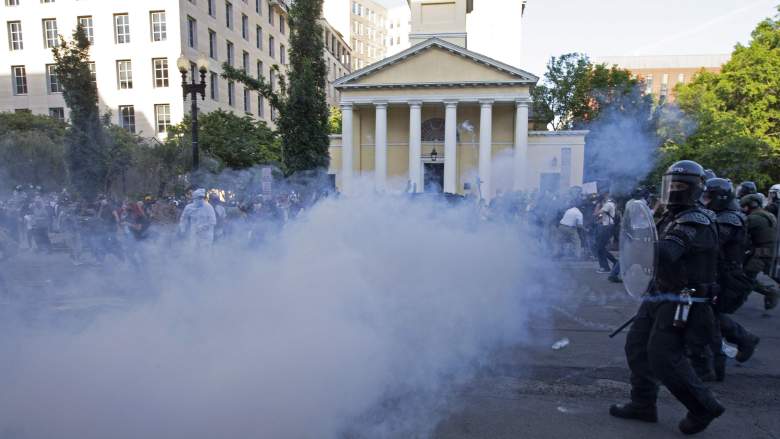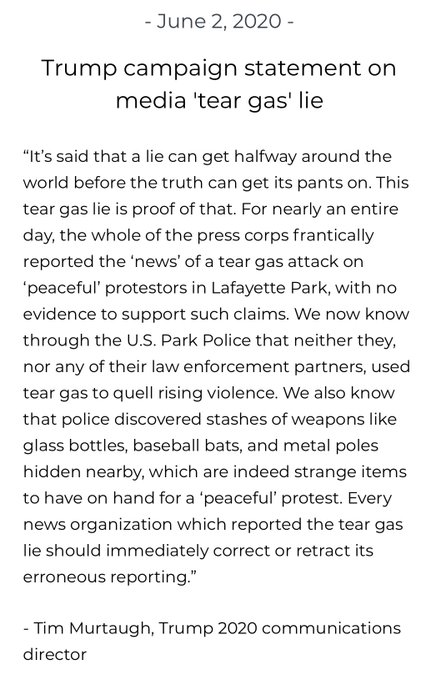
Getty Police officers wearing riot gear push back demonstrators next to St. John's Episcopal Church outside the White House on June 1, 2020, in Washington, D.C.
On the evening on June 2, James Miller, an official on the Defense Science Board and a former under secretary of defense for policy, issued a public letter of resignation to Secretary of Defense Mark Esper, according to the Washington Post. In the letter, Miller accused Esper of violating his oath of office to “support and defend the Constitution of the United States … and to bear true faith and allegiance to the same.”
Specifically, Miller claimed that “[l]aw-abiding protesters just outside the White House were dispersed using tear gas and rubber bullets — not for the sake of safety, but to clear a path for a presidential photo op,” which Esper attended. The incident outside of St. John’s Episcopal Church and the following statement from President Donald Trump received widespread condemnation after footage revealed that police dispersed the crowd using tear gas and rubber bullets.
“President Trump’s actions Monday night violated his oath to ‘take care that the laws be faithfully executed,’ as well as the First Amendment ‘right of the people peaceably to assemble,'” Miller wrote. “You may not have been able to stop President Trump from directing this appalling use of force, but you could have chosen to oppose it. Instead, you visibly supported it.”
Miller went on to condemn Esper for suggesting that governors need to “dominate the battlespace” on Monday. “I cannot believe that you see the United States as a ‘battlespace,’ or that you believe our citizens must be ‘dominated,'” Miller wrote. Miller also impressed upon Esper the need to “contemplate his obligations” to his oath of office, to the men and women serving in the military and to “other Americans whose lives may be at stake.”
“You have made life-and-death decisions in combat overseas; soon you may be asked to make life-and-death decisions about using the military on American streets and against Americans,” Miller said. “Where will you draw the line, and when will you draw it?”
The Trump Campaign Demanded All Media Outlets Correct or Retract Statements Claiming Officers Fired Tear Gas at Protesters Outside the Church
On Tuesday, Trump’s campaign communications director, Tim Murtaugh, issued a statement demanding that the media correct or retract claims that police fired tear gas on protesters to clear the area in front of St. John’s for Trump’s photo op. Murtaugh claimed the officers did not use tear gas and that the media had misidentified the protests as peaceful and nonviolent.
According to Bloomberg, U.S. Park Police also denied that they used tear gas to disperse the crowd, explaining that they used “smoke canisters and pepper balls.” Park police also claimed that protesters were throwing projectiles and attempting to grab officers’ weapons and that police discovered caches of glass bottles, baseball bats and metal poles hidden on the street, according to Bloomberg.
According to the CDC, “Riot control agents (sometimes referred to as ‘tear gas’) are chemical compounds that temporarily make people unable to function by causing irritation to the eyes, mouth, throat, lungs, and skin.”
According to the Episcopal News Service, at least one member of the episcopal clergy was tear-gassed, and Episcopal leaders condemned the decision to push “hundreds of nonviolent protesters and journalists out of Lafayette Square.” Episcopal Church Presiding Bishop Michael Curry said, “the President of the United States stood in front of St. John’s Episcopal Church, lifted up a bible, and had pictures of himself taken. In so doing, he used a church building and the Holy Bible for partisan political purposes.” Curry added, “This was done in a time of deep hurt and pain in our country, and his action did nothing to help us or to heal us.”
The Use of Tear Gas & Other Riot Control Agents is Prohibited in Warfare Under International Law
The 1925 Geneva Convention included a provision to prohibit “the use in war of asphyxiating, poisonous or any other gases” per international law. The United States did not ratify the 1925 protocol until 1975.
The Chemical Weapons Convention of 1993 stated, “[e]ach State Party undertakes not to use riot control agents as a method of warfare.” It defined “toxic chemical” as “[a]ny chemical which through its chemical action on life processes can cause death, temporary incapacitation or permanent harm to humans or animals.” It defined “Riot Control Agent” as “[a]ny chemical… which can produce rapidly in humans sensory irritation or disabling physical effects which disappear within a short time following termination of exposure.” The United States ratified the protocol in 1997. These international protocols have led many to ask why a weapon deemed too severe for battle is still legal for crowd control and civilian self-defense.
Miller Explained That He Made the Letter Public to Encourage Senior Officers to Reconsider Their Obligations
The Washington Post published Miller’s letter in its entirety. You can read that version of the letter below:
Dear Secretary Esper,
I resign from the Defense Science Board, effective immediately.
When I joined the Board in early 2014, after leaving government service as Under Secretary of Defense for Policy, I again swore an oath of office, one familiar to you, that includes the commitment to “support and defend the Constitution of the United States… and to bear true faith and allegiance to the same.”
You recited that same oath on July 23, 2019, when you were sworn in as Secretary of Defense. On Monday, June 1, 2020, I believe that you violated that oath. Law-abiding protesters just outside the White House were dispersed using tear gas and rubber bullets — not for the sake of safety, but to clear a path for a presidential photo op. You then accompanied President Trump in walking from the White House to St. John’s Episcopal Church for that photo.
President Trump’s actions Monday night violated his oath to “take care that the laws be faithfully executed,” as well as the First Amendment “right of the people peaceably to assemble.” You may not have been able to stop President Trump from directing this appalling use of force, but you could have chosen to oppose it. Instead, you visibly supported it.
Anyone who takes the oath of office must decide where he or she will draw the line: What are the things that they will refuse to do? Secretary Esper, you have served honorably for many years, in active and reserve military duty, as Secretary of the Army, and now as Secretary of Defense. You must have thought long and hard about where that line should be drawn. I must now ask: If last night’s blatant violations do not cross the line for you, what will?
Unfortunately, it appears there may be few if any lines that President Trump is not willing to cross, so you will probably be faced with this terrible question again in the coming days. You may be asked to take, or to direct the men and women serving in the U.S. military to take, actions that further undermine the Constitution and harm Americans.
As a concerned citizen, and as a former senior defense official who cares deeply about the military, I urge you to consider closely both your future actions and your future words. For example, some could interpret literally your suggestion to the nation’s governors Monday that they need to “dominate the battlespace.” I cannot believe that you see the United States as a “battlespace,” or that you believe our citizens must be “dominated.” Such language sends an extremely dangerous signal.
You have made life-and-death decisions in combat overseas; soon you may be asked to make life-and-death decisions about using the military on American streets and against Americans. Where will you draw the line, and when will you draw it?
I hope this letter of resignation will encourage you to again contemplate the obligations you undertook in your oath of office, as well as your obligations to the men and women in our military and other Americans whose lives may be at stake. In the event that at least some other senior officials may be inclined to ask these questions after reading this letter, I am making it public.
I wish you the best, in very difficult times. The sanctity of the U.S. Constitution, and the lives of Americans, may depend on your choices.
Sincerely,
James N. Miller
READ NEXT: Atlanta DA Charges 6 Officers After Violent Arrests Are Caught on TV

